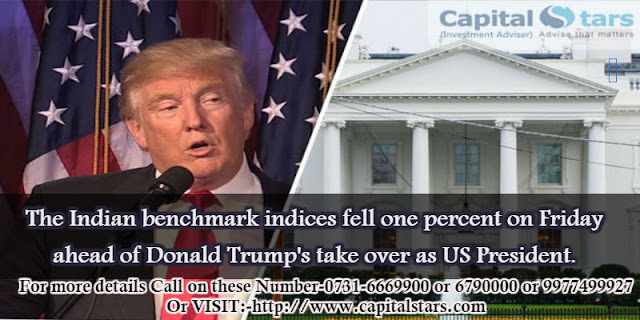The Indian benchmark indices fell one per cent on Friday ahead of Donald Trump's take over as US President. While the benchmark Sensex closed 274.1 points or one per cent lower at 27,034, the Nifty lost 85.75 points or one per cent to close at 8,349.3. Even the broader markets showed a similar trend as the mid cap and small cap indices lost 1.54% and 1.27% respectively.
Weak global cues also impacted the movement of Sensex as the majority of the European indices closed in the red during last session after US Fed Chair Janet Yellen reiterated that US FOMC doesn't plan to keep the interest rates lower for a long time.
According to market participants, this bout of selling in the street was on the account of nervousness among the investors across the Asian markets about the possible policy stance Donald Trump would take on various sensitive issues including free trade, environmental issues and work visa issuances for foreign nationals. Further, the markets are yet to completely factor the risks such as downturn in the outsourcing market which could impact Indian IT sector especially, experts add.
"Indian market ended the trading session on a jittery note amid high volatility as investors remained cautious ahead of the inauguration speech of the US President. Barring FMCG, all major indices saw selling pressure as broader market sentiment remained subdued after Federal Reserve Chairman's hawkish policy stance and unchanged policy rates by ECB," said Jayant Manglik, President, retail distribution, Religare Securities.
Axis bank was the biggest drag in the 30 member Sensex as its shares slumped close to 7% on the back of weaker than expected earnings. The net profit of the private lender fell 73% in Q3 year-on-year (y-o-y). The fall in the Axis shares also weighed down on the banking index which closed 1.7% lower. Shares of Punjab National Bank (PNB) and Bank of Baroda (BoB) fell more than 3% each while shares of SBI lost 2.8%, stock exchanges data showed.
Tata Steel, Adani Ports and L&T were among the other losers in the Sensex as their shares fell in the range of 2.1% to 3.6%.
Market observers also feel that corporate earnings for the quarter ending December could turn a double whammy for the Indian markets as analysts predict both the top line and bottom line of India Inc to shrink due to the impact of demonetisation in the quarter ending December 2016.
"I think the earnings for Q3 would not be subtle due to the impact of demonetisation. The worst hit sectors would be housing, real estate and two wheeler manufacturers. However, we could still have some bright spots.For instance, Oil & Gas and metal players are expected to do well while the bottom-line of public sector banks might improve on an annual basis due to the low base," said Prateek Agrawal, CIO, ASK Investment Managers.
Going forward, market participants expect the Union Budget to be a major trigger for Indian equities as corporate India expects tax cuts, stimulus and increased social spending. "Market participants are expecting robust budget for fiscal 2018 after government's strong move to ban the currency notes," Manglik added.
Share Market Tips















0 comments:
Post a Comment